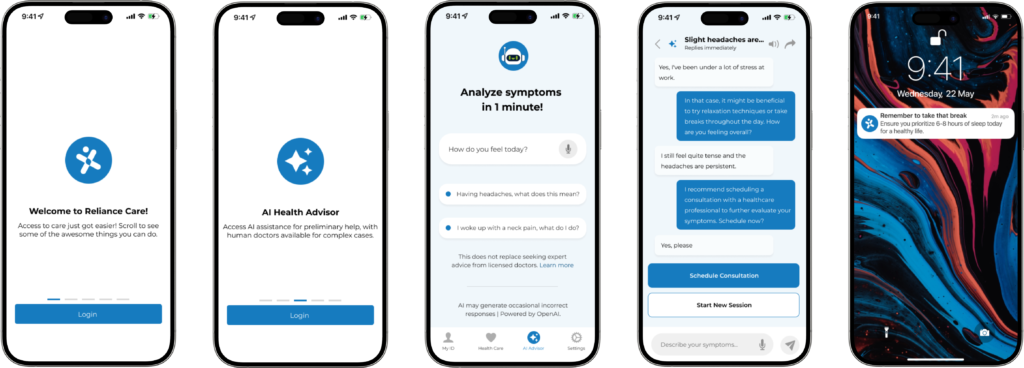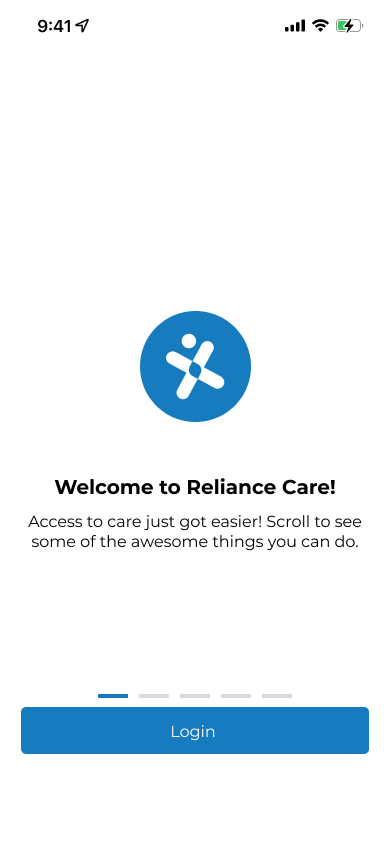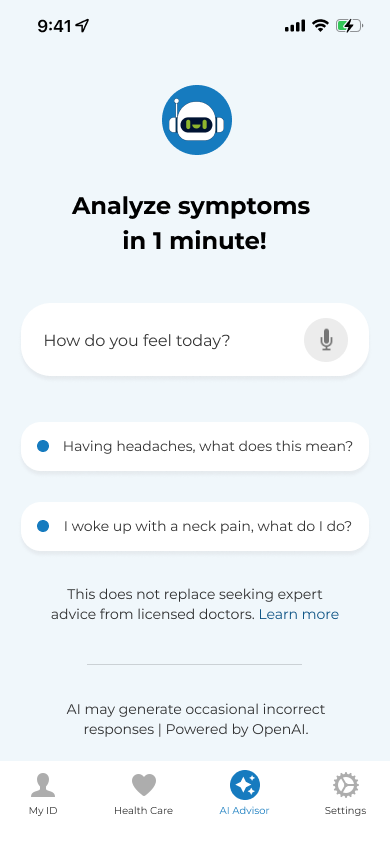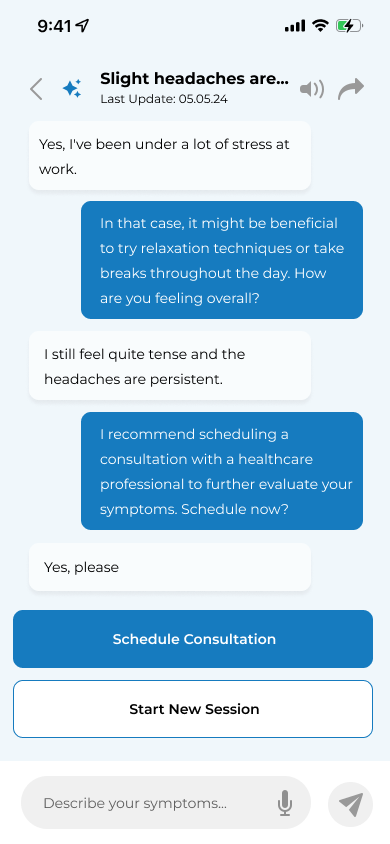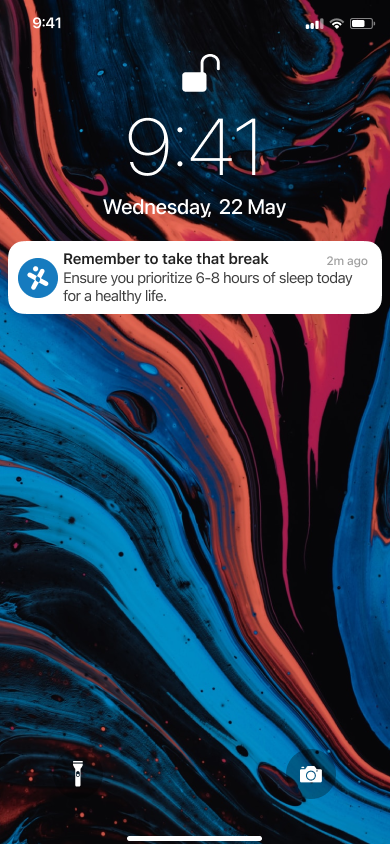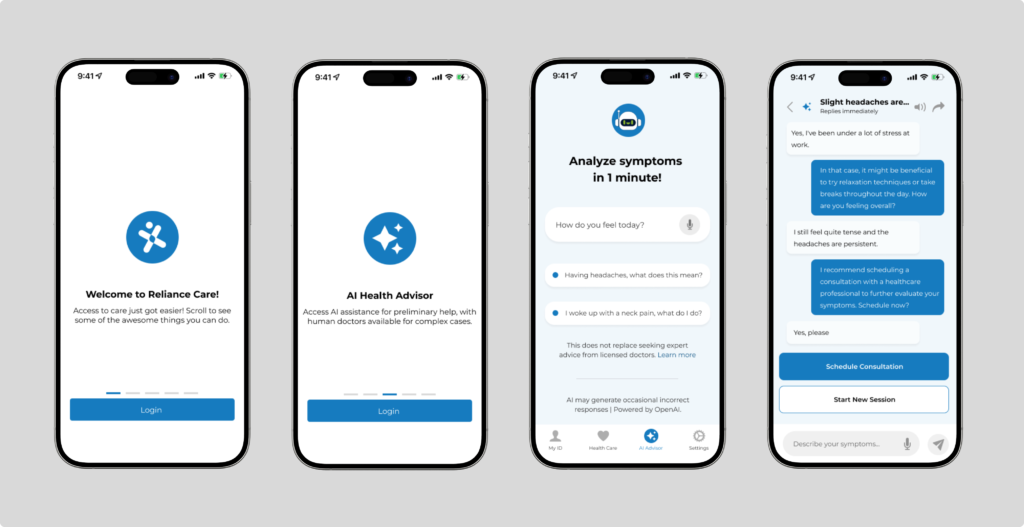
Making healthcare solutions more accessible and engaging, leveraging AI.
THE PROBLEM
Patients need quick access to healthcare support before consultations
THE AUDIENCE
Current users and prospective patients
THE IDEA
Enhance patient care with AI for quick medical advice, personalized health tips, and secure data handling.
My Role & Process
As a product manager, I identified an opportunity and created a process for product discovery and development. Utilizing my UX/UI skills, I conducted research to gain insights and created user-focused designs. Through iterative prototyping, I ensured the creation of an AI-powered solution that met user needs.
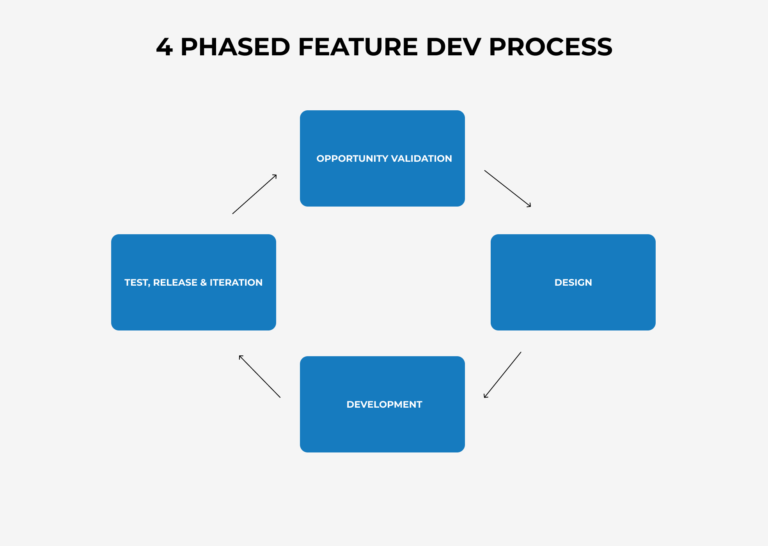
Opportunity Validation
To enhance the patient experience, I first needed to identify improvement opportunities. I conducted user research by speaking with patients to understand their healthcare experiences better. After developing a persona, I was ready to brainstorm solutions.
Market Opportunity
According to Research and Markets, the Telemedicine Market is expected to grow to US$ 317.59 Billion by 2030, at a CAGR of 18.37%.
There is a growing demand for telemedicine and digital health solutions in emerging markets.
Target Audience: Current and prospective users of the Reliance Care app, including employees of organizations that have chosen Reliance for their healthcare needs.


User Persona
Name: Amina
Age: 35
Bio: I run a very busy schedule as an employee and often don’t have the time to book and attend consultations.
Occupation: Social Media Strategist
Location: Lagos, Nigeria
Needs: Quick access to minor medical advice, personalized health tips, and data privacy.
Pain Points: Long wait times for consultations for minor issues, lack of ongoing health guidance.
“Often, I want to check how I feel and get feedback without committing time to schedule a consultation right away.”
Problem Statement
Employees have busy schedules and need seamless access to quick health advice before having to commit to a full consultation. They struggle with long wait and engagement times for minor consultations and a lack of continuous health guidance.
HOW MIGHT WE QUESTIONS:
- How might we provide quick, reliable advice for minor health issues without needing a full consultation.
- How might we offer personalized, periodic health tips to keep patients engaged and proactive?
Design
Next, the product team, in collaboration with other stakeholders, brainstormed ideas in a design workshop. Following this, we collaborated with the Engineers to conduct a technical feasibility study to understand the feature’s technical requirements. Finally, the features were prioritized (using MosCow) to begin development. The high-fidelity UI designs were completed by the end of this phase.
Brainstormed Ideas on Miro

Solution
AI-Powered symptom checker:
- Feature description: An AI-driven symptom checker provides trained responses to common minor health issues. For complex symptoms, it directs patients to consult a doctor.
- User interaction: Patients input their symptoms and receive preliminary advice from the AI. If the issue is beyond the AI’s scope, patients are advised to book a consultation with a doctor.
Periodic health tips:
- Feature description: AI analyzes patient data and lifestyle habits to send personalized health tips and reminders.
- User interaction: Patients receive regular tips on maintaining a healthy lifestyle directly through the app, enhancing engagement and proactive health management.
Product Strategy
Product goal
Improve user well-being and engagement by providing quick medical advice and personalized health tips.
Business goal
Increase revenue by boosting user engagement and driving more meaningful consultations.
Success metrics
Patient health outcomes:
- KPIs: Improvement in patient health metrics, and user satisfaction scores.
- Target: 30% reduction in hospital visits, 90% user satisfaction.
User adoption and engagement:
- KPIs: Number of active users, frequency of feature usage.
- Target: 100,000 users within the first year.
New Product Features:
- AI health advisor: Utilizes Natural Language Processing (NLP) to provide quick medical advice for minor health issues.
- Timely health tips and reminders: Provides personalized health tips and reminders based on user data and lifestyle habits.
Data Collection:
- Gather internal real-world data on common minor health issues and user demographics.
- Collect user data on lifestyle habits, preferences, and health history.
Model Selection and Training:
- Utilize pre-trained NLP models from the open-source platform Hugging Face to expedite development.
- Fine-tune the selected pre-trained model to optimize for specific use cases, such as symptom analysis and health tip generation.
- Test the model extensively to ensure high accuracy and reliability in providing medical advice and health tips.
Inference and Deployment:
- Conduct inference by making the model interpret user inputs and generate appropriate responses for medical advice and health tips.
- Deploy the model within the Reliance Care app to provide seamless access to AI-powered features.
Monitoring and Iteration:
- Monitor user interactions with the AI features to identify areas for improvement and refinement.
- Iterate on the AI models and features based on insights and overall user experience over time.
Risks and Mitigations:
- Safety:
- Risk: Incorrect advice from the AI could harm users and damage the business reputation.
- Mitigation: Ensure AI is trained on extensive data with over 95% accuracy before release. Implement a system to escalate complex cases to human consultants.
- Model accuracy:
- Risk: AI models may provide inaccurate advice or tips.
- Mitigation: Test rigorously and refine based on user feedback.
- Data privacy and security:
- Risk: Handling sensitive user data may raise privacy concerns.
- Mitigation: Use strong encryption and comply with data protection regulations.
- User engagement:
- Risk: Users may not trust or use AI features.
- Mitigation: Ensure clear communication and user-friendly design to encourage trust and interaction.
High Fidelity Screens
